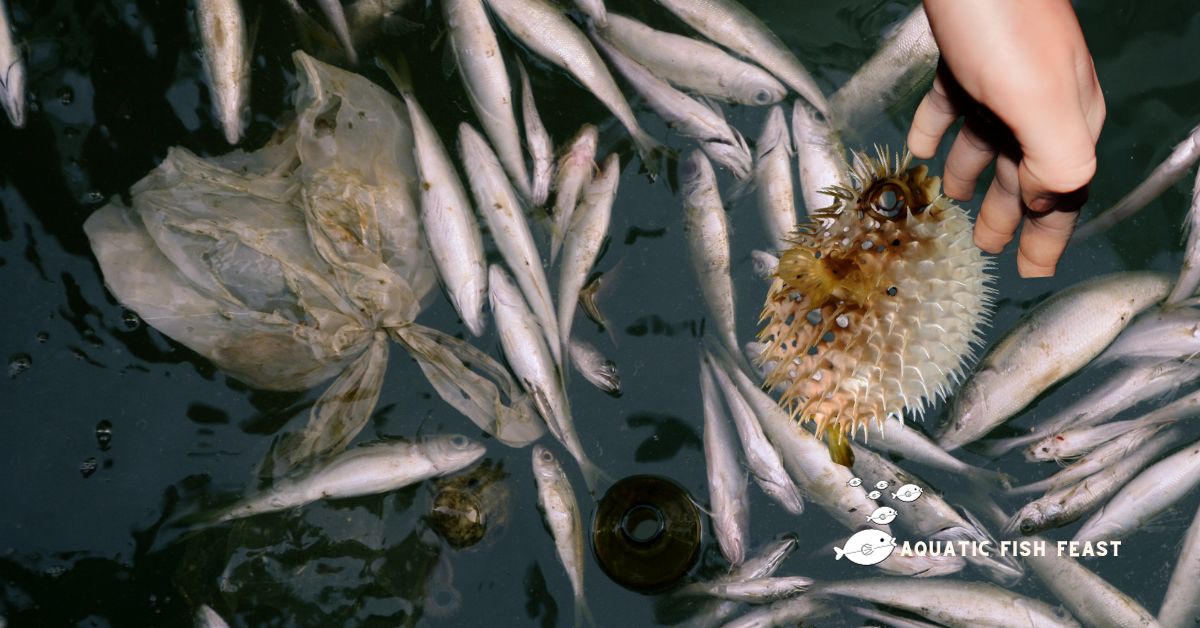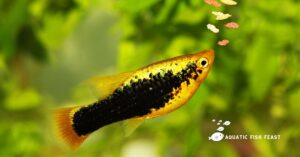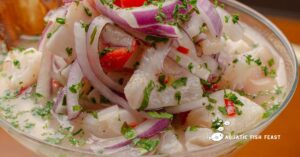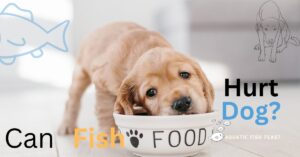Are you aware of the hidden dangers that can be involved when humans eat fish food? Even why fish food was designed is meant to nourish the aquatic life. Have you ever wondered if fish Food can kill humans?
In this eye-opening article, we will go into the question: “Can fish food kill humans?” You are going to discover the potential risks and separate the facts from fearmongers.
It is unclear who would have anticipated that consuming fish food may satiate one’s peculiar appetite. The crux of the matter is that an individual has ingested a quantity of piscine sustenance.
What are the effects of consuming fish food? The concise response and positive outcome is that no consequences will arise.
The food consumed by fish is non-toxic. Fish meal is mostly composed of natural components and does not include arsenic.
Let us go into fish sustenance more and the rationale for its general acceptability for consumption, but with a caveat that we do not endorse such practice.
So sit back, relax, and learn the truth about the safety of fish food and how to protect yourself from any risk.
Now, let’s get started.
Read Also: Can Fish Food Go Bad?
Table of Contents
Can Fish Food Possibly Kill Humans?
Let’s face the truth: Can fish food kill humans? Quite simply, no. Fish food, although designed for aquatic animals, is not intended for humans.
The composition of fish food includes friendly proteins, carbs, vitamins, and minerals. These components are carefully selected to suit fish digestive systems and are harmless to humans.
Now that we know fish food may not be dangerous to humans, we must be careful about chemicals and allergies that can be found in them.
One important fact is that fish food, like other products, can be polluted during production. The contaminants may be bacteria, molds, or dangerous substances.
If a person is sensitive to seafood-based proteins or grains, fish food might cause allergic responses.
The concern mainly lies in the toxicity of some fish food for human consumption.
Many fish meals have chemicals and preservatives that can be dangerous when taken in large amounts.
Some fish food even contains large amounts of copper sulfate, which can harm humans.
Is It Safe For A Human To Eat Fish Food
It depends on how the fish food was made. I used to be a fish food manufacturer. I made my fish food from many wild-collected ingredients from creeks, ponds, wetlands, and so on.
My food was frozen and served raw. Not all the ingredients could be guaranteed to be safe. I would not eat it.
But fish lived better on it than any other food I’ve ever known short of their original wild diets. Maybe even better than that since it was richer than most.
Commercially prepared foods, though, are generally cooked and therefore safe. Never of the stellar quality of my products, but since they are all tested by humans for taste, they don’t dare use my methods.
How to Stay Safe With Fish Food
Even though the risks associated with fish food are relatively low, staying safe is always better. By going by these simple steps, you can ensure your safety when handling fish food:
1. Proper handling and Storage
It is very important to store fish food securely in a place where children or pets cannot easily access it to minimize the risk of accidental ingestion.
You can also keep the fish food containers tightly sealed and label them accurately, as I do most of the time. At least this will help prevent confusion with human food items.
2. Practice a high level of hygiene with fish food.
Treat fish food as you would do to any food product. Store them in a cool, dry place, and don’t expose fish food to direct sunlight.
Wash your hands thoroughly before and after eating fish. These steps help prevent the transfer of any potential contamination from the fish food to your body.
3. Allergy Awareness
If you have seafood or grain allergies, avoid fish food. Read product labels and ask a healthcare professional if you are uncertain.
4. Safe preparation and storage of fish tanks
Set up your aquarium with proper cleaning, disinfection, and tank maintenance in mind. This prevents dangerous bacteria that might affect water and fish food.
Finally, enjoy the wonders of fishkeeping without worrying about any potential risks associated with fish food, avoid using expired fish food, and always check for signs of spoilage or unusual odors before use.
Does Fish Food Contain Poison or Chemicals
It doesn’t include any substances that are dangerous to humans.
Don’t worry if you or your children accidentally eat any of your fish’s food; they will be OK.
Some fish food contains bacteria, parasites, and other microbial and bacterial agents that can damage fish.
The parasites can impact humans. Remember that fish food that is healthy for your fish is safe for you.
Freeze-dried fish meals are healthy for people and fish since they are germ- and parasite-free. Parasites may damage people and fish.
What Are The Ingredients In Fish Food
Yes, you can eat fish meal ingredients! Fish meal has many healthful features.
Fish meals contain proteins, lipids, vitamins, and minerals. The main ingredients are fish, wheat flour, and soybean meal.
Whole fish are dried and crushed into fish meal. Protein and necessary amino acids abound.
Wheat flour is found in bread, pasta, and cereals, as well as fish meals. Fish use wheat flour’s carbohydrate component for energy.
Another typical fish-feeding component is soybean meal. Protein-rich soybean oil byproduct. Fish health benefits from soybean meal’s vital fatty acids.
Cornmeal, shrimp, and squid meal are other fish-feeding components. These components include several fish-healthy elements.
Fish food additives require some considerations. First, use high-quality, toxin-free ingredients. two. Avoid mercury-rich foods like tuna meal.
Third, verify fish food expiry dates. Aged components like fish meal can damage fish.
Fish meal has numerous nutritional components. Quality meals help fish flourish and stay healthy.
What Happens If You Eat Fish Food
We all know fish require food. But what if people eat fish? Can you consume fish food? What happens?
Fish food isn’t for eating. It’s designed to meet fish’s nutritional demands, and thus, eating it may be unsafe.
However, no one has gotten sick from eating fish. Some prefer the fish flavor, and many compare it to shrimp or crab.
Eating fish food is unlikely to harm you. Fish meal is not healthy for humans.
Fish food is edible, but humans have better alternatives.
According to Dr. Sarah Smith, a veterinarian specializing in aquatic medicine, “Fish food is safe for its intended receivers, but inadvertent human intake is dangerous. Although they are rare, fish food additives and pollutants can harm sensitive people.”
What ARE THE Benefits AND Risks OF Eating Fish
Benefits of eating fish:
1. reduce blood pressure a little bit and delay the development of plaque in your arteries.
2. Developing infants may also benefit healthfully from omega-3 fatty acids.
3. By eating the correct seafood, pregnant and nursing mothers can give this nutrition to their unborn children.
4. When the OEHHA suggests eating a certain fish species at least once a week, fish species with greater omega-3 concentrations are indicated with a heart icon (heart healthy).
5. They help to decrease levels of triglycerides
Fish consumption has potential hazards in addition to its nutritional advantages. Fish can consume dangerous toxins from food and water. Their bodies may accumulate levels of chemicals like PCBs and mercury over time.
Mercury and PCB concentrations that are too high can damage the brain and nervous system.
Due to their developing bodies, children, infants, and fetuses are especially susceptible to mercury’s effects.
PCBs have several adverse health effects, including cancer.
Read Also: Can Fish Food Hurt Dogs?
Final Thought:
Even though the question “Can fish food kill humans?” may sound terrifying, the truth is far less despairing.
Fish food, when handled and used correctly, poses fewer risks to human health.
From what I have learned so far, contaminant reactions are rare occurrences.
If anything of the sort were to happen, it can be avoided by following basic cleanliness, storage, and allergy awareness.
However, when it comes to fish food and human consumption, prevention is key.
Be gracious and maintain the joy of a vibrant underwater ecosystem, ensuring that your safety comes first.
So go ahead, continue into the wonders of fishkeeping, and create a harmonious aquatic environment that brings joy to both you and your aquatic companions.
Read Also: Can Baby Eat Fish Maw?




